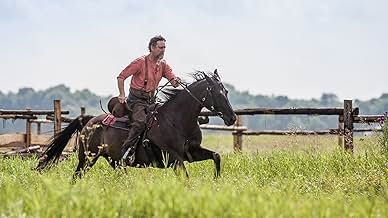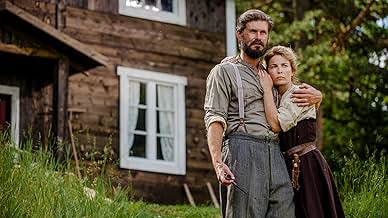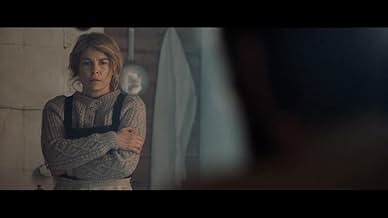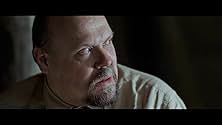Ikitie
- 2017
- 1h 43m
ÉVALUATION IMDb
7,0/10
2,8 k
MA NOTE
Ajouter une intrigue dans votre langueOne night of 1930, nationalist thugs violently abduct Ketola from his home in Finland. Beaten and forced to walk the Eternal Road towards a foreign Soviet Russia, his only dream is to return... Tout lireOne night of 1930, nationalist thugs violently abduct Ketola from his home in Finland. Beaten and forced to walk the Eternal Road towards a foreign Soviet Russia, his only dream is to return to his family cost it what it may.One night of 1930, nationalist thugs violently abduct Ketola from his home in Finland. Beaten and forced to walk the Eternal Road towards a foreign Soviet Russia, his only dream is to return to his family cost it what it may.
- Prix
- 7 victoires et 7 nominations au total
Helén Söderqvist Henriksson
- Martta Hill
- (as Helén Söderqvist)
Hendrik Toompere Jr.
- Toivonen
- (as Hendrik Toompere)
Commentaire en vedette
Ikitie (The Eternal Road) is a morbid film of a man's attempts to get back home, set against the backdrop of the untold story about 10,000 people who voluntarily moved from North America to the Soviet Union to build a worker's paradise, but who eventually learned the true face of Stalin's U.S.S.R.
It is 1931, and the Great Depression is on. Jussi Ketola has recently moved back to Finland from the United States with his family. He has bought a farm, and tends pretty much to himself. All is good and well until right wing extremists, who claim Jussi to be a communist, decide to practice their favourite pastime, namely kidnapping Jussi, driving him a few hundred kilometers to the Soviet border zone, then shooting him (though it might sound odd, these things actually happened in Finland during that tumultuous time). Except that they botch the shooting part and Jussi, heavily wounded, barely escapes across the border to the U.S.S.R.
When Jussi wakes up in a hospital in the Soviet Union, he is greeted by a Finnish police working for the Soviets who, instead of letting Jussi go home, summarily accuse him of being a spy. Unable to escape, Jussi is sent out to a collective farm. This kolkhoz has been built by Americans and Canadians, but mostly by Finnish immigrants who had first moved to North America, but then moved to the U.S.S.R. Their common goal is to build A Worker's Paradise. Jussi's task, on the other hand, is to inform on any suspicious activity. And it is here where the story really begins.
Ikitie tells its disturbing story at a laid-back pace. It is not boring by any means, but the scenes, particularly during the first half of the film, are given plenty time to breath. The same goes for the actors. They have both the space and time to act with nuances. Helped by this, acting flows naturally. People speak their native or common languages (Finnish, English, Russian) with appropriate dialects. Cinematography is lovely, particularly when playing with darkness of the night without crushing everything to black. Colours are perhaps ever-so-slightly muted but still realistic, and - thankfully - there are no teal-and-orange scenes to be seen.
As time goes by in the film, tension slowly but surely rises, right until the dramatic ending. Adding to the tension and pain is the knowledge that things that we see in Ikitie actually did take place on a large scale in Stalin's U.S.S.R. during the purges of the 1930's.
What can I say? I saw Ikitie today at our local theater with my mother and son, and it left us discussing for hours, about local and international history, the Great Depression, the Finnish right-wing extremist movement, Stalin's purges, all of it. If that is not a sign of an exceptionally impressive film, I don't know what is.
Judgment: Highly recommended, just don't expect a light-hearted comedy!
It is 1931, and the Great Depression is on. Jussi Ketola has recently moved back to Finland from the United States with his family. He has bought a farm, and tends pretty much to himself. All is good and well until right wing extremists, who claim Jussi to be a communist, decide to practice their favourite pastime, namely kidnapping Jussi, driving him a few hundred kilometers to the Soviet border zone, then shooting him (though it might sound odd, these things actually happened in Finland during that tumultuous time). Except that they botch the shooting part and Jussi, heavily wounded, barely escapes across the border to the U.S.S.R.
When Jussi wakes up in a hospital in the Soviet Union, he is greeted by a Finnish police working for the Soviets who, instead of letting Jussi go home, summarily accuse him of being a spy. Unable to escape, Jussi is sent out to a collective farm. This kolkhoz has been built by Americans and Canadians, but mostly by Finnish immigrants who had first moved to North America, but then moved to the U.S.S.R. Their common goal is to build A Worker's Paradise. Jussi's task, on the other hand, is to inform on any suspicious activity. And it is here where the story really begins.
Ikitie tells its disturbing story at a laid-back pace. It is not boring by any means, but the scenes, particularly during the first half of the film, are given plenty time to breath. The same goes for the actors. They have both the space and time to act with nuances. Helped by this, acting flows naturally. People speak their native or common languages (Finnish, English, Russian) with appropriate dialects. Cinematography is lovely, particularly when playing with darkness of the night without crushing everything to black. Colours are perhaps ever-so-slightly muted but still realistic, and - thankfully - there are no teal-and-orange scenes to be seen.
As time goes by in the film, tension slowly but surely rises, right until the dramatic ending. Adding to the tension and pain is the knowledge that things that we see in Ikitie actually did take place on a large scale in Stalin's U.S.S.R. during the purges of the 1930's.
What can I say? I saw Ikitie today at our local theater with my mother and son, and it left us discussing for hours, about local and international history, the Great Depression, the Finnish right-wing extremist movement, Stalin's purges, all of it. If that is not a sign of an exceptionally impressive film, I don't know what is.
Judgment: Highly recommended, just don't expect a light-hearted comedy!
- RealLeo
- 28 nov. 2017
- Lien permanent
Histoire
Le saviez-vous
- AnecdotesThe events of the film mostly take part in and around Petrozavodsk and the film makers would have liked to film there, but when scouting for locations, it became clear that the scenery there is nowadays way too modern for a film that takes place in 1930s, thus they had to look elsewhere for suitable locations. Those were eventually found in Estonia.
- ConnexionsFeatured in Dinosaurus (2021)
Meilleurs choix
Connectez-vous pour évaluer et surveiller les recommandations personnalisées
- How long is The Eternal Road?Propulsé par Alexa
Détails
- Date de sortie
- Pays d’origine
- Langues
- Aussi connu sous le nom de
- The Eternal Road
- Lieux de tournage
- Sillamäe, Estonia(Petrozavodsk)
- sociétés de production
- Consultez plus de crédits d'entreprise sur IMDbPro
Box-office
- Budget
- 3 300 000 € (estimation)
- Brut – à l'échelle mondiale
- 1 622 834 $ US
- Durée1 heure 43 minutes
- Couleur
- Rapport de forme
- 2.35 : 1
Contribuer à cette page
Suggérer une modification ou ajouter du contenu manquant




























